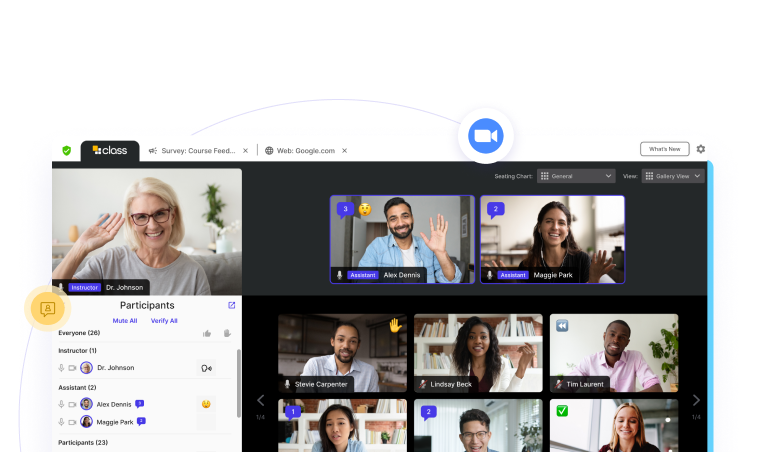
With 25 years in education and technology, Billye excels in global education and tech, with notable contributions across the Middle East, Africa, North America, and APAC. As Director for ANZ and India at Class, she pioneers exceptional virtual and hybrid training programs.

With 25 years in education and technology, Billye excels in global education and tech, with notable contributions across the Middle East, Africa, North America, and APAC. As Director for ANZ and India at Class, she pioneers exceptional virtual and hybrid training programs.

Technology has changed the way we operate throughout society, impacting our education systems, our career paths, and even our personal communication and relationships. As technological advancements continue to shift our operations, the need for continued education has become more apparent. In this new era of rapidly evolving technology, Australia—and all of Asia Pacific—has seen a significant change in the education landscape and the global job market.
With mounting skill shortages, reskilling programs have become crucial for businesses to remain relevant. Addressing skill shortages in Australia can actually vault organisations into a market advantage. In this article, we’ll explore the benefits of reskilling, the importance of lifelong learning strategies, and how school systems and organizations, alike, can benefit from online and hybrid learning.
As technology continues to evolve in global markets, online and hybrid learning models are expanding traditional classroom boundaries, reshaping how knowledge is acquired and applied. At the same time, demand for these flexible learning environments is surging, as evidenced by the burgeoning online education market in Australia. In 2023, alone, online education carved out a $9.5 billion industry, with a growth rate of 4.8% in that same year, according to a report from IBIS World. This upward trend is part of a broader movement observed over the past five years, where that same IBIS World report identified that the annualised market size growth rate was 7.4% from 2018 to 2023.
This evolving space isn’t limited to just the traditional education system, either. Online and hybrid learning are part of a new necessity of lifelong learning which, through emerging technologies, not only aids in keeping workers job-ready, but is also an important tool in addressing skill shortages in Australia. As innovation continues at an ever-increasing pace, new industry sectors arise and mainstay industries are evolving. This shift necessitates a continuous learning approach where individuals proactively upskill in order to remain relevant professionally.
Hybrid and online learning platforms are tackling this learning revolution in ways that allow for accessibility, convenience, collaboration, analysis, and more. Reskilling programs through hybrid and online learning platforms offer flexibility in a way vital to those balancing work, life, and learning. RMIT University’s “Ready, Set, Upskill: Prioritising Skills for a Resilient Workplace” report speaks to this very issue, highlighting the urgent need to address skill shortages in Australia through targeted upskilling and reskilling programs.
Lifelong learning isn’t just a necessity being thrust upon seasoned workers in their career, it is also an attitudinal shift seen in Year 12 graduates, nearly a quarter of whom opt to enter the workforce directly according to the Education Department. This delay of formal post-secondary education in favor of gaining practical experience still allows this population the ability to pursue targeted online or hybrid learning opportunities at a later stage.
Whether recent Year 12 graduates looking for a best-fit academic offering or seasoned workers engaging in a reskilling program, hybrid and online learning platforms, due to their inherent flexibility, cater to the diverse needs of modern learners and this has played a key role in their remarkable success and growth. Institutions and organizations, alike, benefit from expanding their reach, contributing to a more accessible lifelong learning landscape, and fitting into the varied schedules of learners with unique life priorities.
According to the National Skills Commission, the number of skilled occupations experiencing labour shortages in Australia nearly doubled from 2021 to 2022, alone. In an evolving global job market, it’s more crucial than ever to possess the ability to reskill and upskill workers. Reskilling programs that can fit into the busy lives of established members of an organization make the ability to train and meet shifting demands much more plausible.
Hybrid and online learning platforms can tap into collaborative efforts, leverage pre-recorded training modules, and utilize a blend of synchronous and asynchronous efforts to effectively prepare workers for evolving career demands within existing and emerging industries. Additionally, workers who are familiar with hybrid and online learning platforms because of increased use in education systems will experience an even faster learning curve in their ability to embody lifelong learning strategies.
It is unmistakable that the trajectory of online and hybrid learning is upward, being driven by a confluence of technological advancements, evolving workforce requirements, and a societal shift toward lifelong learning. The flexibility, accessibility, and relevance of online and hybrid learning stand out as key factors underpinning the enduring appeal and success of this new path toward navigating shifting educational paradigms.
The future of education and work is undeniably digital. Embracing this reality is essential for fostering a dynamic, skilled workforce poised to meet the challenges of tomorrow. Are you ready to embrace the new reality and encourage an environment of lifelong learning to overcome the widening skills gap? Reach out to a Class team member today, and let’s weave online and hybrid learning strategies into your institution or organization’s future.

With 25 years in education and technology, Billye excels in global education and tech, with notable contributions across the Middle East, Africa, North America, and APAC. As Director for ANZ and India at Class, she pioneers exceptional virtual and hybrid training programs.

With 25 years in education and technology, Billye excels in global education and tech, with notable contributions across the Middle East, Africa, North America, and APAC. As Director for ANZ and India at Class, she pioneers exceptional virtual and hybrid training programs.
Get our insights, tips, and best practices delivered to your inbox

Sign up for a product demo today to learn how Class’s virtual classroom powers digital transformation at your organization.

Features
Products
Integrations